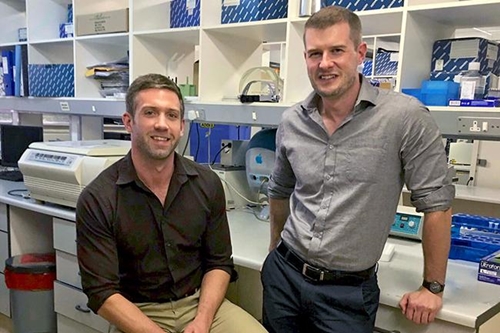19 May 2016. A spin-off company from Harvard University is licensing genetics research to develop more powerful tools to detect drug-resistant strains of HIV. Financial details of the agreement between the 2 year-old Aldatu Biosciences Inc. and Harvard were not disclosed.
Aldatu Biosciences is the creation of pathologist Iain MacLeod and geneticist David Raiser that founded the company in 2014. The company is commercializing research by MacLeod and colleagues at Harvard’s school of public health, where they studied HIV drug resistance as part of the Botswana-Harvard AIDS Institute in Gaborone, Botswana. MacLeod is Aldatu’s chief scientist, while continuing his work with the Harvard’s AIDS initiative. Raiser is the company’s CEO.
While antiretroviral drugs are available to treat HIV infections, the HIV virus continues to evolve, including into strains resistant to some current treatments, which can also elude detection with current tools. The problem is magnified in low-resource regions, where the public health infrastructure is weak, drugs are not always available, and treatments can be interrupted.
Aldatu is commercializing processes that makes more precise detection of differences in the genetic code of HIV viruses, with a technology called Pan-Degenerate Amplification and Adaptation, or Pandaa, developed by MacLeod and Christopher Rowley, now at Harvard Medical School. Pandaa speeds up the analysis of viral genomes, looking specifically for single nucleotide polymorphisms, or SNPs, small variations at specific points in the genome, suspected of causing resistance to drugs.
MacLeod discovered in the field, conventional analytic tools using polymerase chain reactions took 2 to 3 days to analyze just a few samples from patients, which made them infeasible for diagnosing entire populations. Pandaa, says MacLeod, can distinguish between critical SNPs, and avoid other variations in the genome not affecting drug resistance. By focusing on the key SNPs, the analytical process goes much faster.
“A sensitive and affordable Pandaa drug resistance test,” says MacLeod in a company statement, “could help ensure that HIV-infected patients are taking effective medications, help clinicians make informed and cost-efficient decisions about drug prescriptions, and help resource-constrained health care systems save money and treat more patients.”
Raiser and MacLeod began Aldatu Biosciences as part of Harvard Innovation Labs, a program encouraging entrepreneurship among students and faculty. Not long after its founding, the company won the Deans’ Health and Life Sciences Challenge, a competition among start-ups with a $40,000 grand prize.
The new licensing deal gives Aldatu exclusive rights to the university’s intellectual property for Pandaa, applied to clinical diagnostics and lab research on infectious diseases, including disorders other than HIV. The company received a $1.5 million Small Business Innovation Research grant in 2015 from National Institute of Allergy and Infectious Disease, part of NIH, and other seed funding from Charles Hood Innovations.
Read more:
- Gates Funding RNA Treatment for HIV Infection
- USC, Biotech Edit Genes in Stem Cells for HIV Therapy
- Preventive Drugs Found to Stop New HIV Infections
- FDA Approves Pediatric HIV Drug Formulation
- GSK, UNC Chapel Hill Partner on HIV/AIDS Cure
* * *


 RSS - Posts
RSS - Posts
[…] Start-Up Licenses Genetics Technology for HIV Diagnostics […]
[…] on campus. We reported on i-Lab’s opening in 2011, and just last week told about an i-Lab spin-off enterprise developing diagnostics for HIV […]